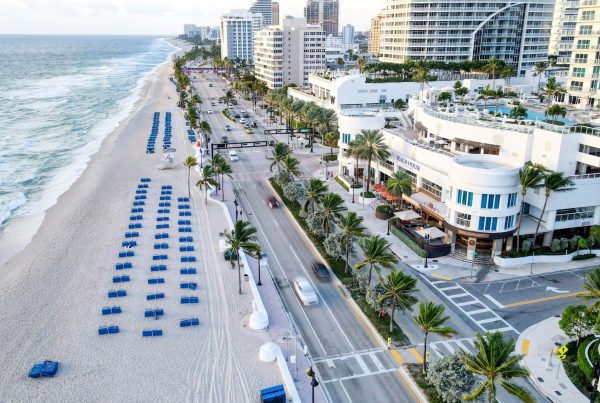Delray Beach city commissioners have stated what they don’t want for the public golf course. They now sort of know what they want, but it relies on wishful thinking.
During a Sept. 18 workshop meeting, commissioners agreed to seek a historic preservation grant that would go toward what Public Works Director Missie Barletto called a needed “full-scale renovation” of the course, part of which famed architect Donald Ross designed. The course dates back nearly 100 years. If the state approved the grant, Delray Beach could get up to $500,000.
The money, however, wouldn’t arrive until 2025. So the commission will press ahead and hope for that grant as a bonus. Which brings us back to the problem that faced the previous commission: How to pay for that renovation?
That commission didn’t want to commit city money for something that only golfers use. So in May 2022 the commission unanimously agreed to seek bids for developing a small portion of the course in return for creating a new course and clubhouse. After public backlash, though, the commission backed off last spring. The two new commissioners, Angela Burns and Rob Long, opposed the idea.
Barletto said the city calculated in 2021 that it would take $15.4 million for new tees, fairways, greens, sand traps and cart paths—everything but the clubhouse. Higher building costs, Barletto said, have pushed that number closer to $20 million.
Mayor Shelly Petrolia then claimed that she had heard from an entity—which she would not name—expressing interest in paying for the renovation. In exchange, the entity would manage the course and make money from greens fees. The city would upgrade the clubhouse and hire a company to manage it. Such an approach, Petrolia said, would “get this done quicker.”
Her colleagues agreed. Most likely, the city will seek bidders for a different public-private partnership—or P3—than the first one. Based on comments at the meeting, the solicitation will specify that residents would get discounted rates, Presumably, a new course would attract more players and thus more profit potential for the operator.
But what if an acceptable offer doesn’t come? The city will be back where it started. The first P3 solicitation produced three intriguing proposals. That approach, though, is now dead.
Commissioner Ryan Boylston said he favored this new approach “if the residents agree.” One resident, former Mayor/avid golfer Jay Alperin, told me that he disputes Barletto’s figure of $15.4 million. Some water projects on the property, he said, benefit the whole city.
Petrolia noted at one point that Delray Beach has talked about the course for a decade, with nothing happening. Something may be starting to happen, but there’s no certainty, and there still may be disagreement on the approach.
Firefighter and police contracts on Boca agenda

On the agenda for Wednesday’s Boca Raton City Council meeting are approvals of new, three-year contracts with the police and firefighter unions.
According to the staff memos, the police contract calls for base salary increases of 7.5 percent for the budget year that began Oct. 1, 4.5 percent for next year and 4 percent for the final year of the contract. Salaries will be adjusted higher for sergeants and lieutenants. Other new benefits include the ability to cash out as many as 80 hours of sick leave each year.
Firefighters also will get a 7.5 percent raise for the current budget year, plus the same 4.5 and 4 percent increases for the next two years. Certification pay for paramedics will go up 16.5 percent, and employees will get to cash in more sick leave.
The raises for next year are roughly twice the current rate of inflation nationally. Higher salaries will make for higher pension payouts. Public safety pensions were a big issue in council elections a decade ago, but the topic has faded as a campaign point. The most recent report from the LeRoy Collins Institute at Florida State University rated Boca Raton’s fire and police pension funds ‘D’ for financial solvency, but public safety endorsements matter in elections.
The council almost certainly will approve both contracts unanimously.
Delray to consider housing near Tri-Rail station
As Delray Beach tries to redevelop Congress Avenue, one focus point is the county complex just south of Atlantic Avenue. It includes regional offices where people can obtain drivers’ licenses, voter registration cards and other services.
It’s also next to the city’s Tri-Rail station. Delray Beach officials would like to see changes that allow housing tied to the station. At Tuesday’s city commission meeting, county officials will make a presentation and offer ideas for the area. Commissioners will make no decision, but they consider this presentation a possible starting point.
Boca looks to finalize Live Local development rules
Also at Wednesday’s meeting, council members will attempt to finalize rules for how Boca Raton processes development projects under the Live Local Act.
The council has been at this for nearly four months. Council members made the mistake of letting developers come before them to state their demands, rather than have the developers and their representatives speak first with city planners. Council members are sensitive to the topic because the law cuts them out of the approval process for such projects.
To show how deep, rightly or wrongly, council members have injected themselves into this issue, consider just one detail of the proposed ordinance.
The law seeks to encourage development of affordable housing. Collectively, the council worried that those residential units would be tiny. The proposed ordinance sets requirements for square footage of apartments under Live Local based on the number of bedrooms.
In most cases, Live Local will apply only to proposals for mixed-use projects in which at least 65 percent of the space is for residential units. I’ll have more after the meeting.
“Potential disparity” in Delray’s awarding of city contracts
A consultant has found that Delray Beach has a “potential disparity” against women- and minority-owned businesses when it comes to awarding city contracts.
At today’s meeting, the consultant will present those findings. The results mean that the study will move to the second phase to confirm and, if necessary, identify those problems. The study’s total cost will be roughly $250,000.







